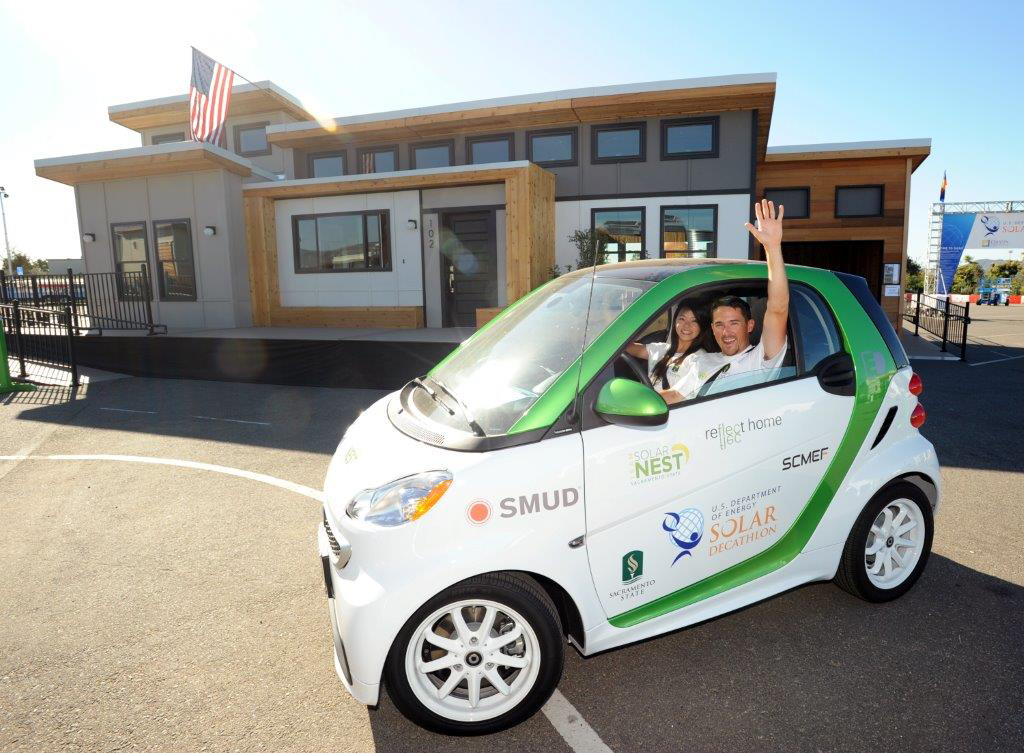Related story: "Construction Management students are tops in the nation"
Sacramento State, competing in its first Solar Decathlon – and going up against schools with more experience and deeper pockets – finished 10th overall in the biennial event that wrapped up Sunday in Irvine.
The U.S. Department of Energy (DOE) challenged 20 collegiate teams from throughout the world to design, build, and operate affordable, sustainable, appealing, modular homes powered by the sun. Teams were judged in 10 categories, with 100 points possible in each.

DOE received 140 applications for the Solar Decathlon 2015 and, in February 2014, announced the 20 colleges and universities that would compete. Six schools – including Yale, Stanford, and Vanderbilt – had funding problems and withdrew well before the decathlon got underway Oct. 8 at the Orange County Great Park.
Sac State’s Team Solar NEST was perfect in the Commuting contest, which required teams to take eight trips in their electric car, driving at least 25 miles in two hours or less. Solar NEST also posted impressive scores in several other contests: Appliances, 97.6; Home Life, 93.5; Affordability, 92.7; and Market Appeal, 90. Sac State, with its modern Reflect Home, ended up in a three-way tie for sixth in Architecture.
Solar NEST struggled to maintain equity between energy production and consumption, ending up with the competition’s lowest Energy Balance score.
“We set out two years ago with a lofty goal and very specific objectives, and I couldn’t be more proud of the results,” says Mikael Anderson, professor and chair of the Department of Construction Management. “The students and faculty who responded to our call made this project possible. Thank you especially to President Nelsen and the 80-plus donors who stepped up and had faith in us that we could produce this amazing home.
“Our team is proud to have completed this journey.”
Sac State’s team was made up of about 80 students and alumni from Construction Management, Mechanical Engineering, Interior Architecture, and Communication Studies. Construction Management led the nearly two-year project, and CM Professor Gareth Figgess was the lead faculty advisor to the team and the hands-on construction manager. The team faced some challenges on the build, mostly brought on by the lack of funding and day-to-day manpower.
“So many times, it would have been easy and maybe wise to throw in the towel,” Figgess says. “But every time we got to that point, something good would happen, somebody would come along. I'm proud of what the team accomplished, and we're happy to walk away knowing we left nothing on the table.”
The Reflect Home, a 997-square-foot, two-bedroom dwelling with stunning indoor and outdoor living spaces, is the result of a competition among students in Professor Shelly Duff’s upper-level Interior Design Studio III course in Spring 2014. It was designed with Sacramento’s seemingly endless sunshine and Mediterranean-like climate in mind.
Students and their faculty advisors built the Reflect Home on campus before dismantling it and transporting it by truck to the Solar Decathlon site.
Mechanical Engineering students, under the guidance of Professor Rustin Vogt, designed and fabricated two of the home’s unique features: a rainwater collection system and waterfall, and a series of translucent panels that provide photovoltaic power while allowing natural light to stream onto the patio. The home’s finishes are top-notch, including clear-cedar exterior siding that continues indoors.
Stevens Institute of Technology was the overall winner of the Solar Decathlon 2015, with a home designed to withstand hurricane-force winds and flooding. This was Stevens’ third consecutive decathlon. Missouri University of Science and Technology, which finished eighth, has now competed in six of the seven decathlons held since 2002.
Cal Poly finished third and was the only other California State University campus selected by the DOE. UC Davis finished seventh and tied for first in the Affordability contest with its $250,000 home for farmworkers. UC Davis had a fundraising goal of $1 million, according to the Sacramento Bee. One team reportedly received $2 million in backing from its university. Sac State’s fundraising goal was $450,000 in cash and in-kind contributions, which was the lowest budget in the competition.
The Reflect Home is being dismantled this week and will be trucked back to Sacramento. It will be placed on a piece of Sac State property beneath the Highway 50 sign, on the south end of campus. It will be open to the campus community – and the greater Sacramento community – by early 2016 at the latest. – Dixie Reid
